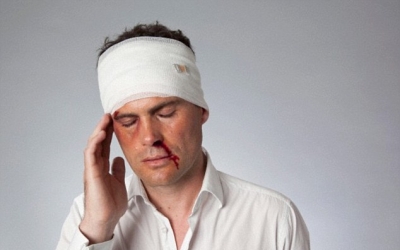- Latest news▼
-
12:16, April 19 Scientists grow human mini-lungs in lab

-
10:23, April 19 JAMA Oncology: Urine test can help rule out high-grade prostate cancer with almost 100% accuracy, study shows

-
18:00, April 18 Daily Mail: Elderly woman in China gets infected with brain-eating amoeba

-
14:19, April 18 Obesity: exercising before breakfast helps you lose weight faster

-
10:42, April 18 The Conversation: childhood trauma can cause pathological hoarding

-
08:37, April 18 Daily Mail: Satiating food reduces cravings for sweets, nutritionist says

-
18:22, April 17 First Armenian-German Conference entitled “Heart Failure Spring School”

-
08:38, April 17 Why do kids usually recover from COVID-19 more easily than adults?

-
14:37, April 16 Daily Mail: intermittent fasting is not suitable for children and women before their periods

-
16:41, April 15 Cell: in carriers of defective BRCA2 gene, sugar consumption increases cancer risk

-
15:04, April 15 305 cases of measles recorded in Armenia so far in 2024

-
14:38, April 15 Food and Environmental Virology: tea contributes to effective coronavirus control

-
12:41, April 15 Daily Mail: vitamin A, B3 and E supplements can be dangerous

-
10:56, April 15 Diabetes Care: evening physical activity is good for the heart

-
08:27, April 15 Women are more susceptible to blood loss and death during bypass surgery than men, researchers say

All materials
Head injuries may lead to the development of dementia later in life

Head injuries may lead to the development of dementia many years later, a new study suggests.
Scientists discovered protein clumps, usually associated with Alzheimer’s disease, in the brains of people who were thought to have long ago recovered from a head injury.
The findings, by researchers from Imperial College London, may help explain why people who have suffered a serious brain injury appear to be at increased risk of dementia.
Although extensive research now suggests major head injury increases dementia risk in later life, until now scientists did not know why this was.
In the research, published in the journal Neurology, the team studied nine patients with moderate to severe traumatic brain injuries.
Many had sustained these in road traffic accidents, such as being hit by a car, between 11 months to 17 years prior to the study.
Although they had no physical disabilities from the injury, many still suffered daily problems with memory and concentration.
Hi-tech scans showed that, like Alzheimer’s patients, their brains contained clumps of beta amyloid protein.
Those who had sustained more damage to nerve fibres in the brain had more of the clumps, or ‘plaques’.
The team also scanned the brains of healthy volunteers, and people with Alzheimer’s disease.
The patients with head injury were found to have more amyloid plaques than the healthy volunteers, but fewer than those with Alzheimer’s disease.
Lead researcher Dr Gregory Scott said: ‘Although patients may seem to have outwardly made a good recovery, when we see them in clinic years later they can have persistent problems which affect their daily life, for example impairments in concentration and memory.
‘Research is increasingly showing that a blow to the head, such as that sustained in a road accident, triggers biological processes in the brain that burn away in the background for years.’
Co-author Professor David Sharp added: ‘The study is small and the findings preliminary, however, we did find an increased build-up of amyloid plaques in people who had previously sustained a traumatic brain injury.
‘The areas of the brain affected by plaques overlapped those areas affected in Alzheimer’s disease, but other areas were involved.
‘People after a head injury are more likely to develop dementia, but it isn’t clear why.
‘Our findings suggest traumatic brain injury leads to the development of the plaques which are a well-known feature of Alzheimer’s disease.’
Dr Clare Walton, research manager at the Alzheimer’s Society, said: ‘The effects of a severe head injury can remain hidden for years.
'More research is needed to understand why they put you at an increased risk of developing dementia and whether there are ways to reduce that risk once a head injury has occurred.’
Dr Rosa Sancho, head of research at Alzheimer’s Research UK, added: ‘Evidence suggests that significant or repeated head injury could lead to an increased risk of dementia, but the biological processes underlying this link are not well understood.
‘The risk factors for Alzheimer’s disease are complex with age, genetics, and lifestyle factors all playing a role.’
Follow NEWS.am Medicine on Facebook and Twitter
- Video
- Event calendar
- Archive
- Most read
month
week
day
- WHO: Nigeria pioneers revolutionary meningitis vaccine 1185
- One-third of women experience menstruation-related migraines, most often during premenopause - study 1174
- Daily Mail: vitamin A, B3 and E supplements can be dangerous 1039
- Food and Environmental Virology: tea contributes to effective coronavirus control 1031
- Cell: in carriers of defective BRCA2 gene, sugar consumption increases cancer risk 1004
- 305 cases of measles recorded in Armenia so far in 2024 996
- Women are more susceptible to blood loss and death during bypass surgery than men, researchers say 970
- Diabetes Care: evening physical activity is good for the heart 926
- Daily Mail: intermittent fasting is not suitable for children and women before their periods 815
- First Armenian-German Conference entitled “Heart Failure Spring School” 594
- Why do kids usually recover from COVID-19 more easily than adults? 485
- Obesity: exercising before breakfast helps you lose weight faster 483
- The Conversation: childhood trauma can cause pathological hoarding 480
- Daily Mail: Elderly woman in China gets infected with brain-eating amoeba 462
- Daily Mail: Satiating food reduces cravings for sweets, nutritionist says 459
- Find us on Facebook
- Poll





